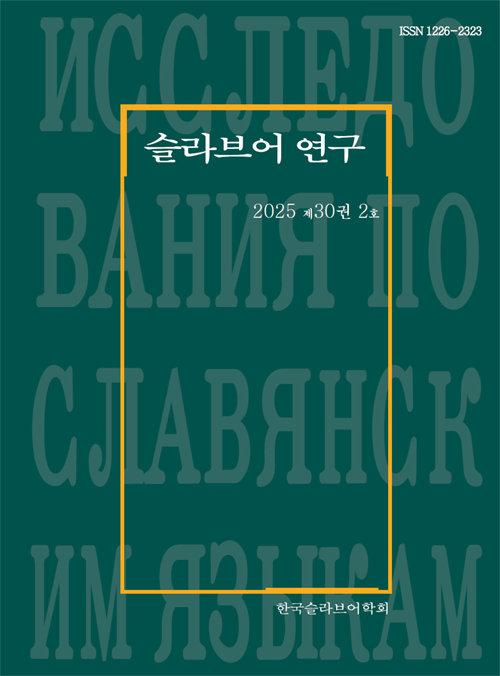- 영문명
- Rhetorical Strategies and Lexico-Semantic Features of Ecological Discourse in Russian Media
- 발행기관
- 한국슬라브어학회
- 저자명
- 권용재(Yongjae Kwon)
- 간행물 정보
- 『슬라브어 연구』제30권 제2호, 91~112쪽, 전체 22쪽
- 주제분류
- 인문학 > 기타인문학
- 파일형태
- 발행일자
- 2025.10.31

국문 초록
This study explores the characteristics of ecological discourse as represented in contemporary Russian media, with a focus on its lexical, semantic, and rhetorical features. The growing urgency of ecological issues, intensified by rapid scientific and technological development in the twentieth century, has brought environmental themes to the center of public and political communication. Within the framework of ecolinguistics, ecological discourse is understood as a communicative phenomenon that both reflects and shapes social attitudes toward the environment.
Drawing on the definitions of Ivanova (2007) and Zaytseva (2014), the paper situates ecological discourse as a set of oral and written texts across genres and styles that address ecological topics directly or indirectly. While Ivanova emphasizes scientific discourse as its core and media texts as peripheral, Zaytseva broadens the concept to include all communicative situations influencing ecological awareness. This divergence reflects the continuing ambiguity of the field in delimiting its central terms.
The analysis of Russian media demonstrates that ecological discourse often relies on emotionally charged vocabulary, rhetorical questions, euphemisms, nominalization, and neologisms. These devices attract attention, provoke emotional responses, or mitigate the severity of ecological problems. For example, ambiguous terms such as устойчивый (“sustainable”) acquire multiple meanings depending on context, while euphemisms like могильник (“burial site” for radioactive waste) illustrate emotional distancing. Neologisms such as экоцид (“ecocide”) represent linguistic creativity that resists anthropocentric views and articulates new ecological values.
Findings confirm that ecological discourse is not a homogeneous type but a complex intersection of genres shaped by political and economic contexts. While linguistic innovation contributes to ecological awareness, discourse must also be analyzed in relation to institutional power and ideology. Ultimately, ecological discourse plays a dual role: it can reinforce anthropocentric perspectives by framing nature as a resource, or it can promote eco-centric models of human–nature relations. The concept of “ecological correctness” illustrates the potential of language to reject exploitative expressions and affirm environmentally responsible values.
영문 초록
목차
1. 서론
2. 생태적 담화의 정의
3. 생태적 담화의 유형
4. 러시아 생태적 담화의 수사 전략
5. 러시아 생태적 담화의 어휘-의미적 특성
6. 결론
참고문헌
키워드
해당간행물 수록 논문
참고문헌
최근 이용한 논문
교보eBook 첫 방문을 환영 합니다!

신규가입 혜택 지급이 완료 되었습니다.
바로 사용 가능한 교보e캐시 1,000원 (유효기간 7일)
지금 바로 교보eBook의 다양한 콘텐츠를 이용해 보세요!



